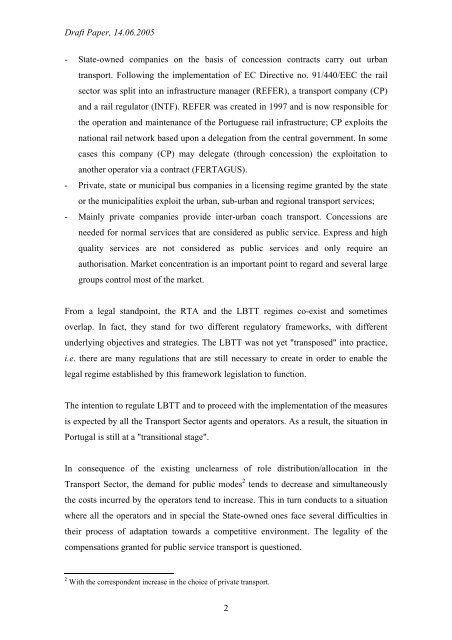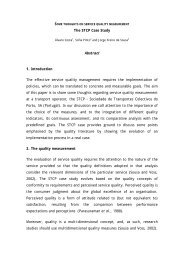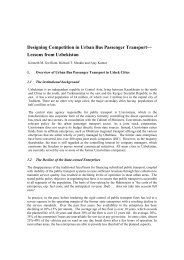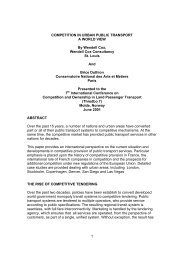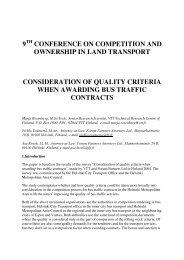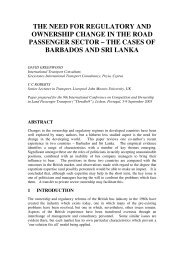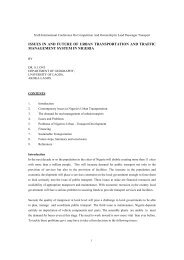Passenger Land Transport in Portugal: Improving Competition by ...
Passenger Land Transport in Portugal: Improving Competition by ...
Passenger Land Transport in Portugal: Improving Competition by ...
Create successful ePaper yourself
Turn your PDF publications into a flip-book with our unique Google optimized e-Paper software.
Draft Paper, 14.06.2005<br />
- State-owned companies on the basis of concession contracts carry out urban<br />
transport. Follow<strong>in</strong>g the implementation of EC Directive no. 91/440/EEC the rail<br />
sector was split <strong>in</strong>to an <strong>in</strong>frastructure manager (REFER), a transport company (CP)<br />
and a rail regulator (INTF). REFER was created <strong>in</strong> 1997 and is now responsible for<br />
the operation and ma<strong>in</strong>tenance of the Portuguese rail <strong>in</strong>frastructure; CP exploits the<br />
national rail network based upon a delegation from the central government. In some<br />
cases this company (CP) may delegate (through concession) the exploitation to<br />
another operator via a contract (FERTAGUS).<br />
- Private, state or municipal bus companies <strong>in</strong> a licens<strong>in</strong>g regime granted <strong>by</strong> the state<br />
or the municipalities exploit the urban, sub-urban and regional transport services;<br />
- Ma<strong>in</strong>ly private companies provide <strong>in</strong>ter-urban coach transport. Concessions are<br />
needed for normal services that are considered as public service. Express and high<br />
quality services are not considered as public services and only require an<br />
authorisation. Market concentration is an important po<strong>in</strong>t to regard and several large<br />
groups control most of the market.<br />
From a legal standpo<strong>in</strong>t, the RTA and the LBTT regimes co-exist and sometimes<br />
overlap. In fact, they stand for two different regulatory frameworks, with different<br />
underly<strong>in</strong>g objectives and strategies. The LBTT was not yet "transposed" <strong>in</strong>to practice,<br />
i.e. there are many regulations that are still necessary to create <strong>in</strong> order to enable the<br />
legal regime established <strong>by</strong> this framework legislation to function.<br />
The <strong>in</strong>tention to regulate LBTT and to proceed with the implementation of the measures<br />
is expected <strong>by</strong> all the <strong>Transport</strong> Sector agents and operators. As a result, the situation <strong>in</strong><br />
<strong>Portugal</strong> is still at a "transitional stage".<br />
In consequence of the exist<strong>in</strong>g unclearness of role distribution/allocation <strong>in</strong> the<br />
<strong>Transport</strong> Sector, the demand for public modes 2 tends to decrease and simultaneously<br />
the costs <strong>in</strong>curred <strong>by</strong> the operators tend to <strong>in</strong>crease. This <strong>in</strong> turn conducts to a situation<br />
where all the operators and <strong>in</strong> special the State-owned ones face several difficulties <strong>in</strong><br />
their process of adaptation towards a competitive environment. The legality of the<br />
compensations granted for public service transport is questioned.<br />
2 With the correspondent <strong>in</strong>crease <strong>in</strong> the choice of private transport.<br />
2


